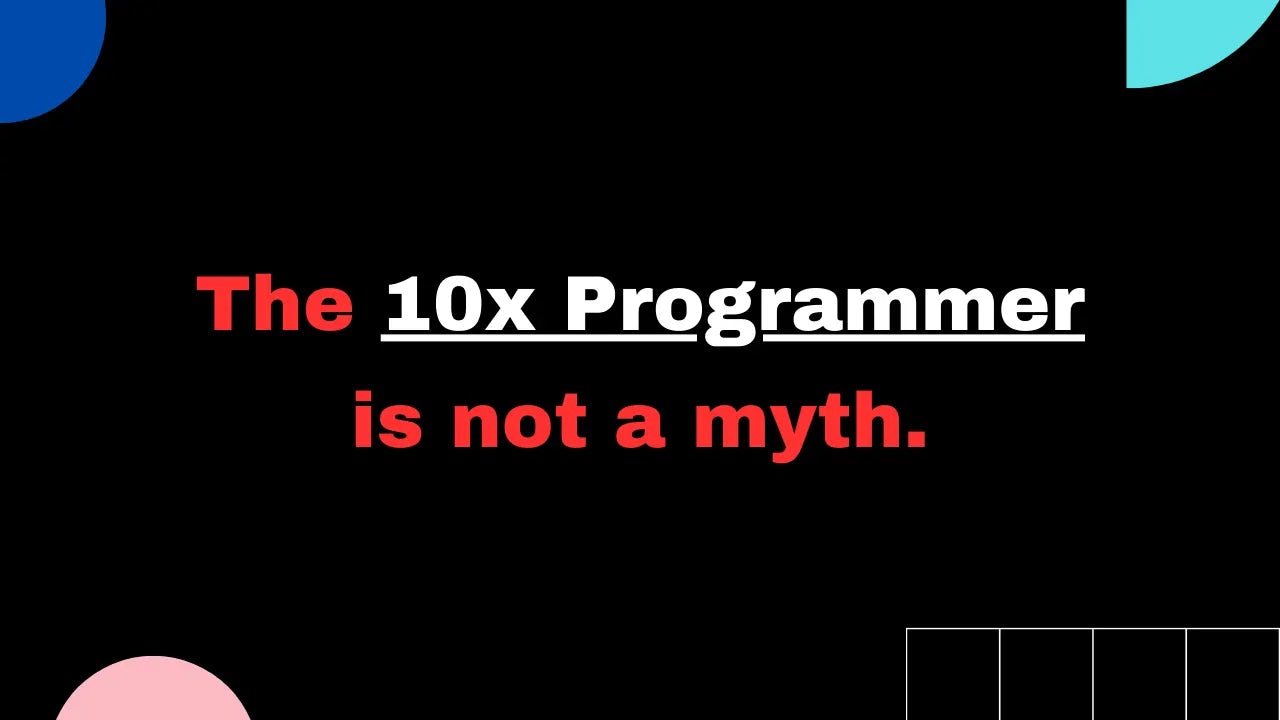The 10x Programmer is not a Myth
Key Points: 10x Programmer
- 10x Programmers significantly outperform average programmers in coding and debugging tasks.
- This concept is based on historical experiments and backed by industry leaders like Bill Gates and Reed Hastings.
- Productive programmers possess exceptional problem-solving skills, mastery of architectural principles, and effective communication abilities.
- Critics bring up the varying individual performance. i.e. Environmental factors can make the 10x Programmer concept less applicable in real-world settings.
What does it mean to be a 10x Programmer?
The concept of a 10x Programmer has its roots in a groundbreaking 1968 study on programming performance - the very first of its kind.
In Santa Monica, California, nine apprentice coders were brought into a room filled with computers. They each received an envelope with instructions for coding and debugging tasks.
The timer was on.
They had to complete the tasks as efficiently as possible within the next two hours.
The researchers anticipated that the top programmer would outdo an average one by two or three times.
Surprisingly, they discovered that the most proficient programmer significantly surpassed the least skilled one. The top programmer completed coding tasks 16 times faster, debugged code 28 times faster, and executed programs 13 times faster than the poorest performer:
| Performance measure | Poorest score | Best score | Ratio |
|---|---|---|---|
| Debug hours Algebra | 170 | 6 | 28:1 |
| Debug hours Maze | 26 | 1 | 26:1 |
| CPU time Algebra (sec) | 3075 | 370 | 8:1 |
| CPU time Maze (sec) | 541 | 50 | 11:1 |
| Code hours Algebra | 111 | 7 | 16:1 |
| Code hours Maze | 2 | 25 | 1:25 |
| Program size Algebra | 6137 | 1050 | 6:1 |
| Program size Maze | 3287 | 651 | 5:1 |
| Run time Algebra (sec) | 7.9 | 1.6 | 8:1 |
| Run time Maze (sec) | 8.0 | 0.6 | 13:1 |
Is 10x Programmer a Myth?
The 10x Programmer concept is not a myth.
Historic experiments show a significant difference between the fastest and slowest programmers.
This concept is not specific to programming. If you ever worked on any kind of project, you met that one person. A "rockstar". The one who seems to work magic. Finishes tasks in record time. Solves complex problems effortlessly. Elevates the entire team's performance.
Value of a 10x Programmer
The concept of a 10x engineer has gained significant attention in the tech industry. Industry leaders like Bill Gates and Reed Hastings believe in the immense value that a top-tier programmer can bring to a company:
...a great writer of software code is worth 10,000 times the price of an average software writer.
— Bill Gates, Co-Founder, Microsoft
Over the years, I’ve come to see that the best programmer doesn’t add 10 times the value. He or she adds more like a 100 times.
— Reed Hastings, Co-Founder, Netflix
10x engineers
— Shekhar Kirani (@skirani) July 11, 2019
Founders if you ever come across this rare breed of engineers, grab them. If you have a 10x engineer as part of your first few engineers, you increase the odds of your startup success significantly.
OK, here is a tough question.
How do you spot a 10x engineer?
What makes a productive programmer?
Being a productive programmer doesn't only mean writing code faster. Software development is much more than writing code. You have to look at the holistic impact of the software on a business.
Spolsky's argument
Joel Spolsky, the co-founder of StackOverflow, argues that average developers never hit the high notes that make great software.
It’s not just a matter of “10 times more productive.” It’s that the “average productive” developer never hits the high notes that make great software.
— Joel Spolsky, Co-Founder of StackOverflow
How to become a 10x Programmer?
I belive these are the top traits you need to have to become a 10x Programmer:
- Exceptional problem-solving skills: 10x programmers excel at analyzing complex issues, troubleshooting, and finding effective solutions quickly.
- Mastery of architectural and design principles: They create high-quality, scalable, and maintainable designs, resulting in better applications and systems.
- Proficient in framework and library development: They implement reusable patterns, templates, and components that form the foundation of applications and improve development efficiency.
- Rapid new application and feature development: They can build new applications and features quickly, utilizing their expert knowledge and refined design patterns.
- Skilled in application extension and refactoring: They can efficiently extend existing applications, abstract and reuse code, and refactor to improve maintainability and performance.
- Creative and innovative: They can develop new features and solutions using existing patterns and cutting-edge technologies, pushing the boundaries of what is possible.
- Detail-oriented and focused on code quality: They produce clean, consistent, and well-documented code, making it easier to maintain and extend in the future.
- Effective communication and collaboration skills: They can work well with others, share knowledge, and mentor less experienced developers, contributing to a high-performing team environment.
- Continuous learning and adaptability: They stay updated with the latest technologies, tools, and best practices, and can quickly adapt to new challenges and changes in the industry.
- Strong work ethic and productivity: They are highly motivated, efficient, and committed to delivering high-quality work promptly, resulting in a significant impact on project outcomes.
Argument against the 10x Programmer concept
The 10x concept entails that you can take a 10x Programmer and put him in any team and they'd perform 10x better than the worst programmer on that team. But there are so many environmental factors that impact work performance.
Because of that, many software developers challenge the 10x concept.
Good and Bad days
One of them is Bill Nichols, a researcher and technical director at the Software Engineering Institute (SEI).
Recently, Nichols examined data from 500 programmers working on 10 exercises. Yes, he found significant variations in programmer performance. But he also found significant variations within a programmer's own performance.
In short — We all have good and bad days.
Nichols also points out other factors that impact performance:
- Physical environment (quiet and appropriate spaces to work)
- Team environment (collaboration and communication)
- Task size (small tasks help address issues early)
- Decision-making authority (pushing it down to developers who have the information)
- Management approach (not overreacting to short-term variations, creating a productive environment)
- Sprint length (balanced to avoid diminishing returns)
Josip Miskovic is a software developer at Americaneagle.com. Josip has 10+ years in experience in developing web applications, mobile apps, and games.
Read more posts →
I've used these principles to increase my earnings by 63% in two years. So can you.
Dive into my 7 actionable steps to elevate your career.
